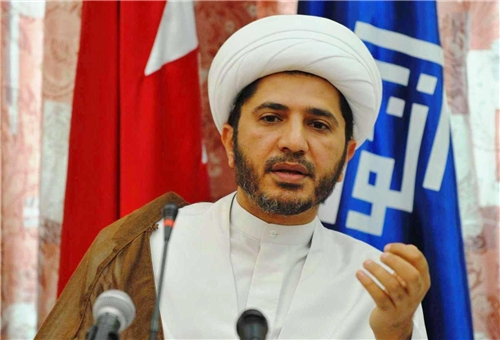On 25 January 2018, Bahraini Advocate General Osama Al Ufi announced that the High Criminal Court again adjourned the trial of Sheikh Ali Salman, Sheikh Hassan Ali Juma Sultan, and Ali Mehdi Ali Al Aswad over accusations of “exchanging intelligence information with Qatar” to undermine the Al Khalifa monarchy in 2011. The next hearing is set for 19 February 2018, purportedly so that the Public Prosecution Office has time to “provide the original recording of the telephone conversation between the first suspect Ali Salman and [Qatar’s former prime minister] Hamad bin Jassim [bin Jaber bin Mohammed bin Thani Al Thani]” – a televised copy of which was presented during the 25 January session. The trial has been repeatedly postponed since it began in November 2018.
Only Sheikh Salman is presently detained, serving a separate prison term based solely on political speeches he gave in his capacity as the leader of the now forcibly dissolved Al Wefaq opposition group. The other two defendants – Sheikh Sultan, a former elected member of the Council of Representatives, and Al Aswad – are also members of Al Wefaq, but they are not currently in government custody. Notably, Sheikh Sultan was publicly defamed in pro-government media over similar allegations in June 2017; at the same time, Bahraini authorities – including officials from the National Security Agency (NSA) – repeatedly detained and tortured his son, Mohamed Hasan Ali Mohamed Juma Sultan, in an attempt to coerce him into becoming an informant to help them target Sheikh Sultan and other political figures. The government arbitrarily stripped Sheikh Sultan of his citizenship in 2015, and he is no longer in the country.
Although the allegations date back to 2011, the authorities only brought charges after Bahrain joined Saudi Arabia, the United Arab Emirates, and Egypt in a diplomatic row with Qatar beginning in June 2017. The charges themselves appear to largely pertain to well-documented communications between Al Wefaq leaders and the Qatari government, which was openly attempting to mediate Bahrain’s political crisis as reported by the Bahrain Independent Commission of Inquiry (BICI) as early as November 2011. Opposition sources allege that Bahraini authorities have doctored and otherwise manipulated the communications to create false indications of wrongdoing, and that Ministry of Interior forces have seized relevant documents that Sheikh Salman intended to send from prison to his lawyers.
Contrary to the Bahraini government’s new accusations, evidence suggests that the Qatari government simultaneously provided support to the ultimate crackdown on the pro-democracy movement when successful mediation appeared unlikely, contributing troops to the Peninsula Shield Force (PSF) deployment and even reportedly abusing and extraditing fleeing protesters, according to the Bahrain Center for Human Rights (BCHR). Since the June 2017 political conflict erupted in the Gulf Cooperation Council (GCC), however, the Bahraini authorities have criminalized many forms of communication and expression relating to Qatar, going so far as to prosecute an attorney for allegedly discussing a legal challenge against the anti-Qatar boycott.
The new charges against Sheikh Salman and other political leaders also come on the heels of a wider assault on Bahrain’s opposition ahead of the 2018 elections for the Council of Representatives. On 17 July 2016, a court affirmed the Bahraini Ministry of Justice’s order to close Al-Wefaq, after the authorities had seized the group’s assets, blocked its website, and shuttered its headquarters. The government has taken similar action against nearly all opposition groups, including Wa’ad, the largest secular leftist society, which was dissolved in 2017. A conviction in this new case would ensure that Sheikh Salman, the leader of Bahrain’s largest political bloc, remains arbitrarily incarcerated during the upcoming election season.
Sam Jones is a researcher at ADHRB.





